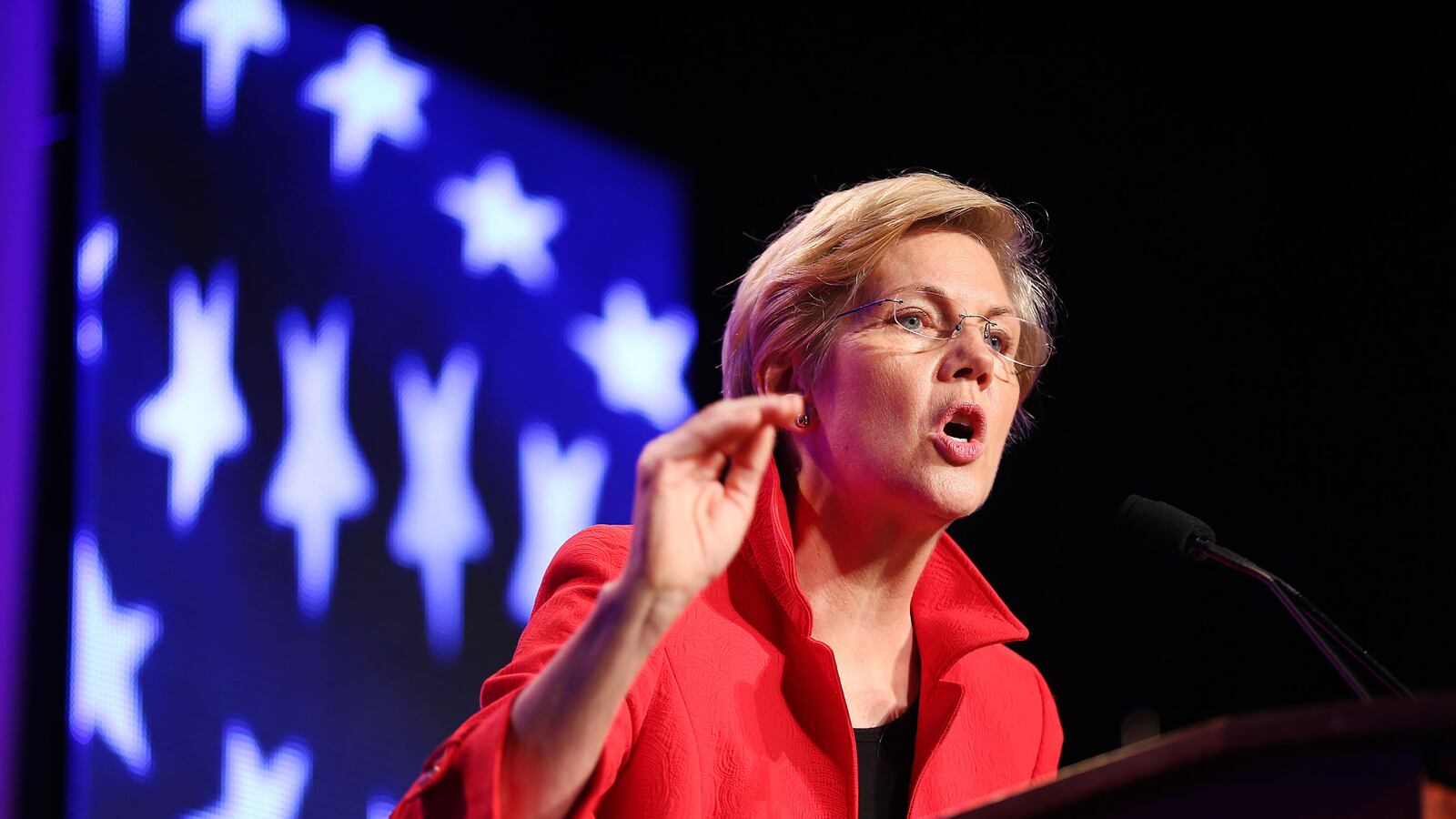If there’s a big winner to emerge from last week’s “Cromnibus” budget battle, it’s Massachusetts Senator Elizabeth Warren. While Ted Cruz turned himself into a pariah yet again (he is fast becoming the Cousin Oliver) of the GOP), Warren gave a speech that made her progressive fans swoon and her critics—not to mention Hillary Clinton—-take notice.
More interestingly, free-market types such as myself could get behind a good chunk of Warren’s jeremiad, too, especially the way she underscored the moebius-strip-like continuity between Big Government and Big Business. In attacking Wall Street’s malicious and pervasive influence over Washington, Warren channeled the spirit of Teddy Roosevelt, who loved to lash out at “malefactors of great wealth.” The bailout crybabies of Goldman Sachs, JP Morgan Chase, Wells Fargo, and all the rest are easy targets—and deserving ones, too. Pity the billionaire? Never!
“Enough is enough with Wall Street insiders getting key position after key position and the kind of cronyism we have seen in the executive branch,” she railed the day before the Cromnibus sailed through the Senate. “Enough is enough with Citigroup passing 11th hour deregulatory provisions that nobody takes ownership over but that everybody comes to regret.”
Unfortunately, Warren’s populist outrage and calls to break up Citigroup and other mega-banks are ultimately misguided, naive, and contradictory. Like too many progressives, she’s against cronyism except when she’s for it—and she’s supremely confident that if only she and her rag-tag band of reformers were calling the shots, government regulators would never, ever bend to the will of special interests.
Good luck with that. One thing that leftist historians such as Gabriel Kolko and public-choice libertarians such as Nobel laureate James Buchanan agreed on is that regulatory bodies are routinely and perhaps inevitably “captured” by the very people and businesses they’re supposed to oversee. Back in the 1960s and early ‘70s, Kolko infuriated good-government types with his revisionist take on one of the most clear-cut triumphs of the Progressive Era: the regulation of interstate railroads. Paralleling the arguments of Buchanan and other libertarians, Kolko said that, whatever complaints they may have had about federal oversight, rail barons quickly realized they could lock in their market advantage most effectively through regulation. “It was not the existence of monopoly that caused the federal government to intervene in the economy,” he argued, “but the lack of it.”
Warren should take the holidays to catch up on Kolko. In her speech last week, Warren was specifically exorcised by a change to section 716 of the Dodd-Frank banking regulation law, which covers “swaps pushouts.” At its most simplified, the revision allows big players more access to insured deposits while making certain types of bets. Who doesn’t want to gamble with other people’s money? While the amount in question is comparatively small change—just 0.5 percent of total bank assets are affected—Warren is totally correct to be calling out the process by which rules are written and rewritten.
At the same time, how naive can a person be? If you’re Elizabeth Warren, the answer is endlessly. Earlier this year, for instance, she colored herself aghast that Dodd-Frank, a truly gargantuan pile of words championed by Barack Obama and a Democratically controlled Congress, wasn’t working out so well, especially when it came to dispersing concentration in the financial sector. “The four largest banks are nearly 40 percent bigger today than they were just five years ago,” she observed. “These banks…are a whole lot bigger now than they were when we bailed them out in 2008 because they were too big to fail.”
None of this would have surprised Kolko, who died earlier this year, or Buchanan, who died in 2013. This sort of outcome is the rule, not the exception, whether we’re talking about railroads, financial institutions, or “disruptive innovators” such as Uber, which is now starting to collude with municipal governments to make life tougher for its rivals.
Recognizing the dynamics of regulatory capture or ineffectiveness needn’t lead to policy nihilism or chaos. That’s especially true when it comes to markets, which are extremely good at squeezing out firms and businesses that deserve their comeuppance. The best thing the government can do when it comes to the concerns of Warren and other progressives is step down rather than step up. You want less concentration in banking—at least the type that will screw the little guy and imperil the economy? Then make it clear that there will be no bailouts, not that there will be bailouts up to this or that size.
Think about it: Dodd-Frank was explicitly passed to drive a stake through the heart of the implicit concept of “too big to fail.” Instead, everyone agrees it has simply reinscribed too big to fail as explicit law. The argument now is how to limit certain types of plays that banks can make under certain circumstances. The law itself was 848 pages and, four years after its passage, only about half of its rules have actually been completed, and those regulations total well over 14,000 pages already.
Trying to fine-tune all that to a desired end is not only a form of madness but doomed to failure.
The housing bubble was at very the center of the financial crisis that birthed Dodd-Frank. Like the financial sector, the housing industry is massively regulated in all sorts of ways. All sorts of government policies blew that bubble up until it popped. For decades, the feds have promoted home ownership as an unalloyed good through tax policy, the creation of government-sponsored entities that would buy up any mortgage under virtually any circumstance, rules dictating loan terms and down payments, and more. The Federal Reserve, partly to shore up the housing market, has for decades now done everything it can to keep interest rates impossibly low which, among other things, fuels the stock market and other forms of speculation.
As much as Wall Street might want to believe it controls all aspects of the economy, they couldn’t have screwed it up all by themselves. It’s time to let them try.






